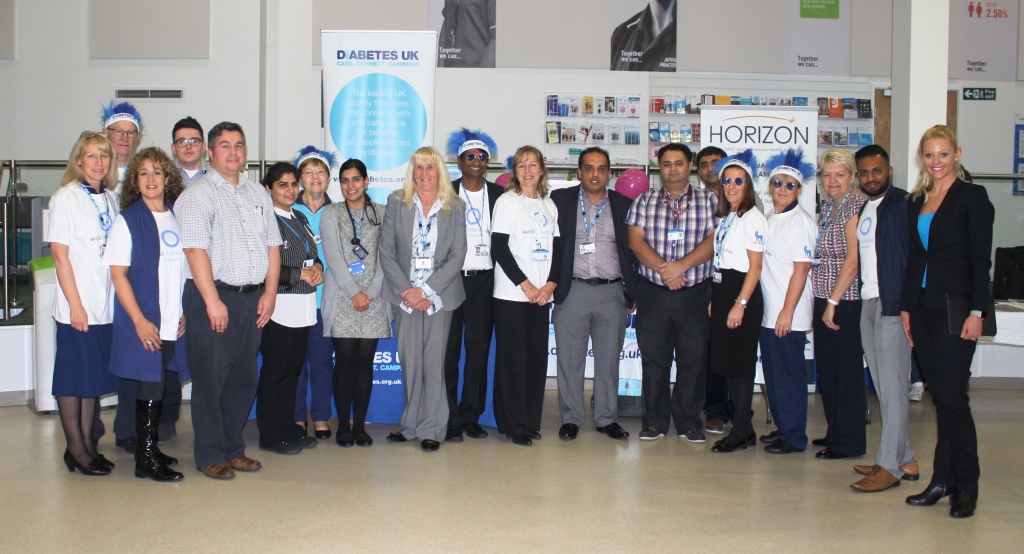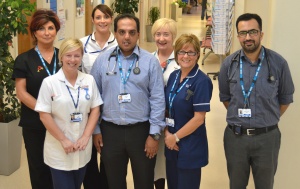
The Trust’s Chief Executive (Interim), Wendy Swift (centre, in grey suit), with diabetes specialist staff from the Trust and representatives of Diabetes UK at Blackpool Victoria Hospital on Monday, November 14, to mark World Diabetes Day
Blackpool Teaching Hospitals NHS Foundation Trust is joining Diabetes UK to get across the message that every day 65 people in the UK die early from the condition and hundreds more face life-changing complications.
New analysis by Diabetes UK and Blackpool Diabetes UK Group, released today (Monday, November 14) on World Diabetes Day, reveals the scale and seriousness of the diabetes crisis. Blackpool Tower will tonight be lit up in blue – the signature colour of Diabetes UK – to hammer home this extremely serious message.
In the last three years, the number of adults diagnosed with diabetes in Blackpool has increased by more than 5 per cent, largely due to a rise in Type 2 diabetes.
GP records show there are now 10,752 registered patients with diabetes aged 17 and older – an increase of 275 people in the last year alone.
As well as early deaths, Diabetes UK analysis of official data shows on an average day:
- 20 people have lower limbs amputated, of which around 80% are preventable
- 203 experience heart failures and 78 have strokes
- 39 people need dialysis or kidney transplants
Vince McNulty, 71, who has lived with Type 2 diabetes for 11 years and is a member of the Blackpool Diabetes UK Group, said: “There are thousands of people with diabetes in Blackpool who often don’t know the risks of complications and are not given the tools to manage their condition properly.
“As a group we hope to offer support to people living with both Type 1 and Type 2 diabetes as well as raising awareness. We’d urge people living with diabetes in the area to get in touch and meet others managing the condition in Blackpool.”
Blackpool Teaching Hospitals has been working in partnership with Diabetes UK on many of the issues surrounding the condition.
The Trust and the charity want to ensure that people living with diabetes are aware of the risks and provide encouragement to make simple lifestyle changes that can help maintain good health.
Patients with diabetes can be particularly prone to foot ulcers so the Trust and Diabetes UK are working together to ensure that healthcare professionals and patients understand the risks. The main aim is to see these patients before their foot ulcers worsen.
The Trust’s Consultant Diabetologist, Dr Shahjehan Qazi, works with a team which includes a Diabetes Specialist Nurse and Podiatrists.
The Fylde Coast Integrated Diabetes Foot Care Pathway was launched in 2013. It is supported by local Clinical Commissioning Groups (CCGs), Diabetes UK and stakeholders to provide risk assessments of patients with diabetes.
The pathway has recently been reviewed in order to streamline it further making it possible for patients with active foot disease to be seen within 24 hours so that appropriate care can be provided quickly.
There are also plans to have a rolling programme of education for healthcare professionals caring for people with diabetes. These improvements are part of current five year strategic review.
Trevor Morris, Clinical Pathways Manager for the Trust, said: “The Trust is providing more care for patients with long term conditions in community settings, including patients’ homes.
“New technologies enabling patients to be monitored at home are helping to make this possible.
“The implementation of our strategy will allow us to provide high quality patient care with people spending less time in hospital. New models of care, like extensive care and enhanced primary care, currently being rolled out across the Fylde coast, will be a way to enable this.
“Working with forward thinking organisations like Diabetes UK will help support the implementation of these new models of care.”
Complications for patients with diabetes can often be avoided if they are supported to manage the condition well.
For example, research funded by public donations to Diabetes UK proved specialist eye tests were crucial for spotting tiny changes early, which can then be treated. As a result diabetes is no longer the leading cause of blindness in the working age population.
Understanding the condition and getting the care to which people are entitled is essential. Yet only a small minority of people with diabetes are currently going on life-saving diabetes education courses and are sometimes missing vital health checks.
Stephen Ryan, Head of the North at Diabetes UK, said: “Diabetes is a killer.
“It’s a serious condition with serious, life-threatening complications.
“It is the fastest-growing epidemic of our time. The more you know about diabetes, the better. Cutting your risk of developing devastating complications is crucial. You can talk things through with our specialist helpline team who really understand diabetes and make sure you’re getting all of the 15 vital checks and services you’re entitled to from the NHS.
“Diabetes is set to rise dramatically in the next five years so it is vital that the condition is more widely understood and governments and health bodies listen and take action.
“Significant investment in diabetes care and prevention by UK and national governments and the NHS, begins to recognise the scale of the challenge.
“This needs to be sustained to provide enough effective care for everyone living with diabetes and tackling the rapid rise of Type 2. As a charity, we have ambitious plans to tackle the diabetes crisis. Our work is only made possible through the generosity of our supporters.”
Diabetes UK’s Helpline offers free information and advice about diabetes and trained counsellors explore emotional, social and psychological or practical difficulties. Calls and emails are answered Monday to Friday 9am–5pm, phone 0345 123 2399 or email helpline@diabetes.org.uk.
For more information about the work of Diabetes UK, diabetes education programmes in the UK or the 15 healthcare essentials check list please visit www.diabetes.org.uk.
About diabetes
Diabetes is a condition where there is too much glucose in the blood because the body cannot use it properly. If not managed well, both Type 1 and Type 2 diabetes can lead to devastating complications. Diabetes is one of the leading causes of preventable sight loss in people of working age in the UK and is a major cause of lower limb amputation, kidney failure and stroke.
People with Type 1 diabetes cannot produce insulin. About 10 per cent of people with diabetes have Type 1. No one knows exactly what causes it, but it’s not to do with being overweight and it isn’t currently preventable. It usually affects children or young adults, starting suddenly and getting worse quickly. Type 1 diabetes is treated by daily insulin doses – taken either by injections or via an insulin pump. It is also recommended to follow a healthy diet and take regular physical activity
People with Type 2 diabetes don’t produce enough insulin or the insulin they produce doesn’t work properly (known as insulin resistance). 85 to 90 per cent of people with diabetes have Type 2. They might get Type 2 diabetes because of their family history, age and ethnic background puts them at increased risk. They are also more likely to get Type 2 diabetes if they are overweight. It starts gradually, usually later in life, and it can be years before they realise they have it. Type 2 diabetes is treated with a healthy diet and increased physical activity. In addition, tablets and/or insulin can be required.
– ENDS –
For further media information please contact the Diabetes UK media relations team on 020 7424 1165 or email pressteam@diabetes.org.uk. For urgent out of hours media enquiries please call 07711 176 028.
For more information on reporting on diabetes, download our journalists’ guide: Diabetes in the News: A Guide for Journalists on Reporting on Diabetes (PDF, 3MB)

